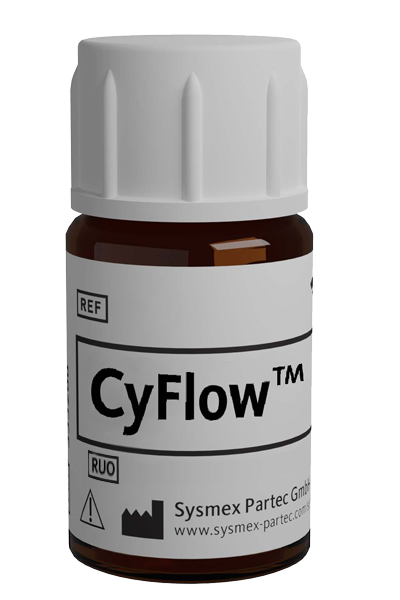CyFlow™ CD154 Purified

| Alternative Name: | CD40L , gp39, IMD3, T-BAM, TNFSF5, TRAP-1 |
| Antibody: | Yes |
| Antigen: | CD154 |
| Application: | Flow cytometry, Functional assays, Immunocytochemistry, Immunohistochemistry, Immunoprecipitation |
| Clonality: | monoclonal |
| Clone: | MR-1 |
| Field of Interest: | Immunophenotyping, MHC |
| Format/Fluorochrome: | Purified |
| Isotype: | IgG1 |
| Regulatory Status: | RUO |
| Source Species: | Hamster |
| Target Species: | Mouse |
| Product number: | CB085220 |
For Research Use Only
| Concentration Unit | mg/mL |
| Concentration | 1 |
| Quantity | 0.1 mg |
| Volume | 0.1 mL |
| Immunogen | Activated mouse Th1 clone D1.6 |
| Background Information | CD154 / CD40L (CD40 ligand) is a member of the tumor necrosis factor family, and is expressed primarily on activated CD4+ lymphocytes, but also on mast cells, basophils, eosinophils and human dendritic cells. Its counter-receptor CD40 is expressed on antigen presenting cells, including dendritic cells, macrophages, and B cells, and also on fibroblasts. Triggering of CD40 by CD40L causes maturation of dendritic cells and upregulation of antigen presentation in functions of the MHC and costimulatory molecules. CD40L also functions as a direct stimulating factor for T cells. CD40L plays also roles e.g. in antibody class switching and modulation of apoptosis in the germinal center. |
| Storage Buffer | The reagent is provided in phosphate buffered saline (PBS) solution, pH ≈7.4, containing 0.09% (w/v) sodium azide. |
| Storage | Avoid prolonged exposure to light. Store in the dark at 2-8°C. Do not freeze. |
| Stability | Do not use after expiration date stamped on vial label. |
| Noelle RJ, Roy M, Shepherd DM, Stamenkovic I, Ledbetter JA, Aruffo A: A 39‑kDa protein on activated helper T cells binds CD40 and transduces the signal for cognate activation of B cells. Proc Natl Acad Sci USA. 1992 Jul 15; 89(14):6550‑4. < PMID: 1378631 > | Wu Y, Zhou Q, Zheng P, Liu Y: CD28‑independent induction of T helper cells and immunoglobulin class switches requires costimulation by the heat‑stable antigen. J Exp Med. 1998 Apr 6; 187(7):1151‑6. < PMID: 9529332 > | Howard LM, Miga AJ, Vanderlugt CL, Dal Canto MC, Laman JD, Noelle RJ, Miller SD: Mechanisms of immunotherapeutic intervention by anti‑CD40L (CD154) antibody in an animal model of multiple sclerosis. J Clin Invest. 1999 Jan; 103(2):281‑90. < PMID: 9916140 > | Salgado CG, Nakamura K, Sugaya M, Tada Y, Asahina A, Koyama Y, Irie S, Tamaki K: Functional CD40 ligand is expressed on epidermal Langerhans cells. J Leukoc Biol. 1999 Aug; 66(2):281‑5. < PMID: 10449168 > | Hwang Y, Nahm MH, Briles DE, Thomas D, Purkerson JM: Acquired, but not innate, immune responses to Streptococcus pneumoniae are compromised by neutralization of CD40L. Infect Immun. 2000 Feb; 68(2):511‑7. < PMID: 10639411 > | Lode HN, Xiang R, Pertl U, Förster E, Schoenberger SP, Gillies SD, Reisfeld RA: Melanoma immunotherapy by targeted IL‑2 depends on CD4(+) T‑cell help mediated by CD40/CD40L interaction. J Clin Invest. 2000 Jun; 105(11):1623‑30. < PMID: 10841521 > | Fischbein MP, Ardehali A, Yun J, Schoenberger S, Laks H, Irie Y, Dempsey P, Cheng G, Fishbein MC, Bonavida B: CD40 signaling replaces CD4+ lymphocytes and its blocking prevents chronic rejection of heart transplants. J Immunol. 2000 Dec 15; 165(12):7316‑22. < PMID: 11120867 > | Luzina IG, Atamas SP, Storrer CE, daSilva LC, Kelsoe G, Papadimitriou JC, Handwerger BS: Spontaneous formation of germinal centers in autoimmune mice. J Leukoc Biol. 2001 Oct; 70(4):578‑84. < PMID: 11590194 > | Shin T, Kennedy G, Gorski K, Tsuchiya H, Koseki H, Azuma M, Yagita H, Chen L, Powell J, Pardoll D, Housseau F: Cooperative B7‑1/2 (CD80/CD86) and B7‑DC costimulation of CD4+ T cells independent of the PD‑1 receptor. J Exp Med. 2003 Jul 7; 198(1):42613. < PMID: 12847135 > | Murakawa T, Kerklo MM, Zamora MR, Wei Y, Gill RG, Henson PM, Grover FL, Nicolls MR: Simultaneous LFA‑1 and CD40 ligand antagonism prevents airway remodeling in orthotopic airway transplantation: implications for the role of respiratory epithelium as a modulator of fibrosis. J Immunol. 2005 Apr 1; 174(7):3869‑79. < PMID: 15778341 >
